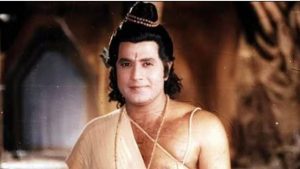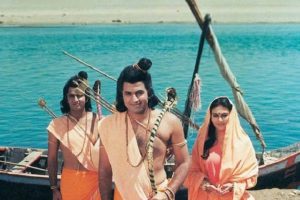Legacy of Arun Govil’s Lord Ram
Arun Govil’s portrayal of Lord Ram in Ramanand Sagar’s 1987 television series Ramayan left an indelible mark on Indian culture. His performance became the gold standard for mythological characters on Indian television. He not only acted in the role, but lived it with deep conviction and emotional purity, which resonated with millions of viewers. For many, he wasn’t just an actor—he was Lord Ram incarnate.
During the late ’80s, families across the country would gather to watch the show, treating the experience like a religious ceremony. Streets would fall silent as viewers tuned in with folded hands and reverence in their hearts. The series created a cultural wave that cemented Arun Govil’s image as Lord Ram permanently in the public psyche.
Even decades later, Ramayan continues to be referenced for its spiritual authenticity, storytelling, and simplicity. For many Indians, any actor who takes on the mantle of Lord Ram will inevitably be compared to Arun Govil. That legacy, both a blessing and a burden, sets an almost unattainable benchmark.

Also Read : Aamir Khan Defends Remakes, Says ‘Sitaare Zameen Par’ Offers a Fresh Lens and Not Just a Frame-by-Frame Copy
Govil’s Reaction to Recent Adaptations of Ramayan
Recently, several filmmakers have attempted to reimagine the Ramayan for the big screen with a modern touch. The most prominent example is Adipurush, directed by Om Raut and starring Prabhas, Kriti Sanon, and Saif Ali Khan. Despite its hype, the film was heavily criticized for its lackluster dialogues, underwhelming visual effects, and the casual tone taken in its depiction of revered characters.
Reacting to these developments, Arun Govil made his reservations known. In an interview with NDTV, he said, “Three-four people tried recreating it, [but] they were not successful. I don’t think in our lifetime someone should try to recreate Ramayan.” His statement reflects disappointment in the recent trend of retelling mythological stories with more focus on visual appeal than cultural substance.
Govil’s discontent is not just about the execution. It’s about the intent and the understanding of what Ramayan means to Indian society. According to him, these stories are sacred, not just scripts to be performed or spectacles to be monetized. The Arun Govil Ramayan remake actors conversation is deeply tied to this belief that recreating mythological narratives should not compromise their sanctity for entertainment.
“No One from the Current Crop of Stars Can Play Lord Ram”
When asked if any actor from the current generation could match the depth needed to portray Lord Ram, Govil was clear and candid. He said, “All the available actors, all the stars at this moment – I don’t think anyone is suitable. Maybe you can find someone outside the industry.”
This strong opinion sparked conversations in both the film industry and among fans. Govil did not mean that today’s actors lack skill, but rather that they may not possess the inner purity, devotion, and spiritual composure required for the role. His portrayal was rooted in a deep sense of dharma, respect, and knowledge of Indian cultural values.
The debate around Arun Govil Ramayan remake actors isn’t merely a critique—it’s a cultural discussion about who should represent deified figures. It raises a larger question about the emotional and moral responsibility actors take on when playing religious icons.

Ranbir Kapoor as Lord Ram: A Bold and Risky Move
The upcoming Ramayan movie, directed by acclaimed filmmaker Nitesh Tiwari, has created huge anticipation. With Ranbir Kapoor set to play Lord Ram and Sai Pallavi cast as Sita, the film promises an ambitious reimagining of the ancient epic. The casting of KGF’s Yash as Ravana and Sunny Deol as Lord Hanuman adds more weight to the project.
Images leaked from the sets last year gave fans a glimpse of Kapoor’s physical transformation and intense preparation for the role. However, critics and devotees alike continue to question whether a star known for romantic and contemporary roles can embody the divine persona of Ram.
Arun Govil, while respectful toward Ranbir’s acting caliber, remained skeptical. “He has moral values, good nature. But we’ll have to wait and see if it comes out well,” he remarked. This cautious optimism reflects Govil’s hopes that the makers handle the story with the seriousness and reverence it deserves.
The upcoming Ramayan will be released in two parts—first in Diwali 2026 and the second in 2027. With such a high-stakes release schedule and fan expectations, the challenge lies not just in cinematic execution, but in spiritual representation.
Political Support and Cultural Endorsement
During the Waves Summit 2025, Maharashtra CM Devendra Fadnavis praised the project, calling it a “global-quality retelling” of one of India’s most important epics. He said, “I was amazed to see the quality of Ramayan that you are creating. This is the way we need to tell our stories to the new generation.”
This official endorsement adds political weight and validation to the film. It also demonstrates how the Ramayan isn’t just a cinematic venture—it’s a cultural movement. But it simultaneously raises the stakes. The moment a project like this receives public and political support, it must live up to not only artistic expectations but spiritual and emotional benchmarks too.
The keyphrase Arun Govil Ramayan remake actors continues to dominate headlines as conversations about spiritual authenticity take center stage.
Modern Filmmaking vs Spiritual Responsibility
The core of Arun Govil’s concern lies in the idea that today’s actors, driven by commercial success, might not approach such characters with the reverence they demand. In mythological narratives, spiritual responsibility often outweighs acting ability.
Govil believes portraying Lord Ram requires discipline, humility, and a spiritual connection. “You can’t fake it,” he has said in earlier interviews. “The audience can sense whether you’re genuinely respectful of the character or just performing.”
Today’s Bollywood often focuses on high-end graphics and star power. While this can attract younger audiences, it also risks alienating traditional viewers who connect with these stories at a deeply emotional level.

The Burden and Blessing of Recreating Epics
Recreating an epic like Ramayan is both a burden and a blessing. The opportunity to share such a sacred story with a new generation is a gift, but mishandling it can cause cultural offense. Adipurush was a lesson in how not to reinterpret sacred texts. Now, all eyes are on Nitesh Tiwari’s Ramayan to correct that course.
Arun Govil’s reflections shouldn’t be seen as criticism alone. They serve as guidance. He represents the voice of a generation that grew up with spiritual values, where mythological storytelling wasn’t just entertainment but devotion.
The Challenge of Living Up to a Legacy
The conversation around Arun Govil Ramayan remake actors isn’t going away soon. As new versions of Ramayan hit the big screen, the responsibility to do justice to the characters—and the story—intensifies.
Govil’s doubts remind filmmakers and actors of the deep-rooted emotions attached to these stories. Portraying Lord Ram isn’t about fame or performance—it’s about embodying timeless values.
As audiences await Ranbir Kapoor’s version, they do so with cautious hope and unwavering standards shaped by Govil’s unforgettable legacy.

